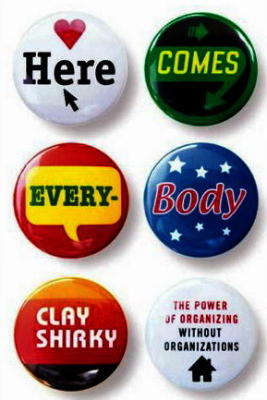Organizing Without Organizations
 I discovered an interesting book while listening to a podcast of The Brian Lehrer Show. It's Here Comes Everybody: The Power of Organizing Without Organizations written by Clay Shirky. I was happy to see that my library had a copy I could pick and and read.
I discovered an interesting book while listening to a podcast of The Brian Lehrer Show. It's Here Comes Everybody: The Power of Organizing Without Organizations written by Clay Shirky. I was happy to see that my library had a copy I could pick and and read.
At first look, the book seems to be about all the Web 2.0 goodness that many of us have been playing with the past few years - social networks, blogs, wikis et al. Read a bit further into the book and you see that Shirky is interested in what happens when the rest of the crowd gets to using these tools. He is theorizing that when everybody comes to that place it will transform the relationship between individuals and the big hierarchical institutions that dominated our pre-Internet society and are being flattened.
Shirky wears several hats (teacher, media critic, telecom consultant, art major, theatrical director) so it's not surprising that he looks at our digital networking age through filters that are philosophical, sociological, economic and statistical.
His view balances successes and failures. On the successful side are projects like the user-generated Wikipedia, balanced by duds like the L.A. Times Wikitorial for user-gen op-ed writing. In fact, print journalism takes it on the chin here.
A review/interview on Ars Technica points to a story Shirky tells from the real good old days of 1492. The printing press had some time to get established by then and there were critics. One was an Abbot named Johannes Trithemius who -
...wrote a treatise on the superiority of the scrivener's life to the vulgarity of movable type. But Trithemius had a problem: he wanted his book to reach a broad audience, and that would have been impossible if he had relied on his fellow scribes to reproduce the book by hand. So he had the book printed. As Shirky puts it, "The content of the Abbot's book praised the scribes, while its printed form damned them."
Shirky wrote more about this idea in a post on his publisher's blog (Penguin):
It's worth noting that most of the arguments made against the printing press were correct, even prescient. Readily available translations of scripture did destroy the Church as a pan-European institution. Most of the material produced by the new class of publishers was flyweight. Scribes did lose their social function. And so on, through a battery of transformations including public scrutiny of elites, the international spread of political foment, and even literate women. (The book to read on these transitions is Elizabeth Eisenstein's two-volume work The Printing Press as an Agent of Change.)
All of which brings me to the internet. It too democratizes both production and consumption of media. It too is producing a staggering volume of new material, some good but most flyweight. It too is upending the role of traditional gatekeepers and destroying the older economics of scarcity. And it too is leading to a cottage industry of hand-wringing: "Why can't we just get a little bit of internet, but keep most things the way they were?"
Clay Shirky's personal website will also has a blog for this new book that updates the book with posts of related material like Newspapers and the Net and even posts and comments from readers correcting typos in the book's first edition.
In education, I see a small but growing number of teachers using these tools, but we have a ways to go before the change will be widespread. Students are important agents of change for educational technology both in what they bring to the classroom and their expectations for what teachers should be using.
Clay Shirky says that communications tools don't get socially interesting until they get technologically boring. He explains that by comparing it to the automobile.
"In a way, the kind of real transformation of the American landscape by the automobile—the rise of the suburbs, the change in work and living patterns, and so forth—could only happen after cars themselves—and in particular, the fact of the internal combustion engine—had become boring."
I'm curious to see how long it takes teachers to be comfortable (bored) enough with Web technologies to start doing really interesting things with them.
Here is a video of Shirky talking about the book
RESOURCES
There have been a few shelves worth of books the past few years about the transforming powers of these Internet-based movements. Here's ten that are a good starting list - enough to teach a course or two.
- Out of Control: The New Biology of Machines, Social Systems, & the Economic World
- Tools for Thought: The History and Future of Mind-Expanding Technology
- The Virtual Community: Homesteading on the Electronic Frontier
- Smart Mobs: The Next Social Revolution
- The Revolution Will Not Be Televised : Democracy, the Internet, and the Overthrow of Everything
- The Wealth of Networks: How Social Production Transforms Markets and Freedom
- Wikinomics: How Mass Collaboration Changes Everything read a review
- Group Genius: The Creative Power of Collaboration
- Blessed Unrest: How the Largest Movement in the World Came into Being and Why No One Saw It Coming
- Collective Intelligence: Creating a Prosperous World at Peace
Comments
No comments